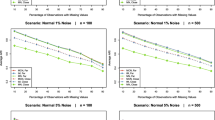Abstract
We analyse how the training algorithm for the Generative Topographic Mapping (GTM) can be modified to use class information to improve results on incomplete data. The approach is based on an Expectation-Maximisation (EM) method which estimates the parameters of the mixture components and missing values at the same time; furthermore, if we know the class membership of each pattern, we can improve the generic algorithm by eliminating multi-modalities in the posterior distribution over the latent space centres. We evaluate the method on a toy problem and a realistic data set. The results show that our algorithm can help to construct informative visualisation plots, even when many of the training points are incomplete.
Access this chapter
Tax calculation will be finalised at checkout
Purchases are for personal use only
Preview
Unable to display preview. Download preview PDF.
Similar content being viewed by others
References
C. M. Bishop and G. D. James. Analysis of Multi-phase Flows Using Dual-energy Gamma Densitometry and Neural Networks. Nuclear Instruments and Methods in Physics Research, A, 327:580–593, 1993.
C. M. Bishop, M. Svensen, and C. K. I. Williams. GTM: The Generative Topographic Mapping. Neural Computation, 10(1):215–235, 1998.
C.M. Bishop. Neural Networks for Pattern Recognition. Oxford University Press, New York, N.Y., 1995.
A.P. Dempster, N.M. Laird, and D.B. Rubin. Maximum Likelihood from Incomplete Data via the EM Algorithm. J. Roy. Stat. Soc. B, 39:1–38, 1977.
Z. Ghahramani and M. I. Jordan. Learning from incomplete data. Technical report, AI Laboratory, MIT, 1994.
Y. Sun, P. Tino, and I. Nabney. GTM-based Data Visualisation with Incomplete Data. Technical Report NCRG/2001/013, NCRG, Aston University, 2001.
Y. Sun, P. Tino, and I. Nabney. Visualisation of incomplete data using class information constraints. Technical Report NCRG/2001/018, NCRG, Aston University, 2001.
V. Tresp, S. Ahmad, and R. Neuneier. Training neural networks with deficient data. In Jack D. Cowan, Gerald Tesauro, and Joshua Alspector, editors, Advances in Neural Information Processing Systems, volume 6, pages 128–135. Morgan Kaufmann Publishers, Inc., 1994.
V. Tresp, R. Neuneier, and S. Ahmad. Efficient methods for dealing with missing data in supervised learning. In D. S. Touretzky, G. Tesauro and T. K. Leen, editors, Advances in Neural Information Processing Systems, volume 7, 1995.
Author information
Authors and Affiliations
Editor information
Editors and Affiliations
Rights and permissions
Copyright information
© 2002 Springer Science+Business Media New York
About this chapter
Cite this chapter
Sun, Y., Tino, P., Nabney, I. (2002). Visualisation of Incomplete Data Using Class Information Constraints. In: Winkler, J., Niranjan, M. (eds) Uncertainty in Geometric Computations. The Springer International Series in Engineering and Computer Science, vol 704. Springer, Boston, MA. https://doi.org/10.1007/978-1-4615-0813-7_14
Download citation
DOI: https://doi.org/10.1007/978-1-4615-0813-7_14
Publisher Name: Springer, Boston, MA
Print ISBN: 978-1-4613-5252-5
Online ISBN: 978-1-4615-0813-7
eBook Packages: Springer Book Archive




